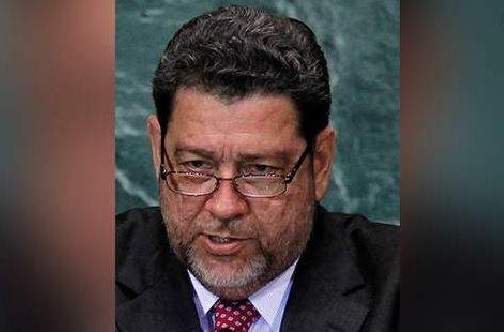On June 17, 2020, the United Nations Convention to Combat Desertification (UNCCD) convened a global roundtable discussion via the zoom platform in recognition of Desertification and Drought Day, under the theme “Is it time for a new social contract for nature”.The panelists for this conference included Ministers of Environment from India, United Arab Emirates, Mauritania and Saint Vincent and the Grenadines, who were all asked to share experiences and lessons learned during this global pandemic that has crippled many economies around the world. This is not the first time the United Nations has reached out to this country to share our experiences with the world as an example of effective public policies that positively impact our people.
Previously, SVG has spoken at conferences hosted by the International Renewable Energy Agency (IRENA) on our work in building a sustainable energy mix that focuses on environmentally friendly renewable energy; the Food and Agricultural Organisation, to detail our work on reducing undernourishment and malnutrition through the Zero Hunger Trust Fund (ZHTF), to the point where the country was awarded for our work in this regard and most recently; the World Health Organisation, commending this country for our work in managing the Covid-19 pandemic.
In this latest request, the Under Secretary General of the United Nations, requested of SVG, that we share our story of sustainable land management as a means of promoting sustainable livelihood through proper agricultural practices that reduce land degradation.
Below is the full text of the excellent presentation made at the conference by Minster of Agriculture, the Honourable Saboto Ceasar.
Salutations
I wish to greet colleague Ministers, ambassadors, dignitaries, and specially invited guests.
Mr. Chair, it is an esteemed honour, to participate in this topical global discussion, within the context, and against the backdrop, that the world is fighting one of its most monumental challenges to human civilisation, in recent history.
Mr. Chair, intensive troubleshooting, to find solutions, to the avalanche of seemingly insurmountable challenges, will occupy policy makers, and all value chain stakeholders, for the next decade, to extents that we could not plan for, predict, or could have foreseen.
The unpredictability of the vagaries of climate change; the COVID 19 pandemic and the resultant implications on land; food security and migration are some of the issues which small island developing states, like St. Vincent and the Grenadines, must grabble with on a day to day basis. These are impacts with a timing of their own!
With a population of 110,000 citizens and a landscape size of 150 square miles, the successes of our resilience plans, and mitigation strategies, are equality critical, if we are to achieve economic growth trajectories and reach the targeted Sustainable Development Goals by 2030.
Our mantra simply, is that, “Live and Living must continue and we will rebuild better.”
Mr. Chair, St. Vincent and the Grenadines has been able amid the onslaughts of a global pandemic; the worst drought in 50 years; and the start of a hurricane season predicted to be hyperactive, to cement significant successes.
Mr. Chair, permit me to list several of these strategic interventions aimed at sustainable food production and productivity; climate change resilience; and environmental protection, and specifically, aspects of methods used to prevent land degradation.
Firstly, strategic land use methodologies have been adopted.
The establishment of a national Green House Park, which acts as a major food production Centre, has addressed the important issue of sustainable production of vegetables, utilising irrigation systems, in an agri-ecological zone, which sustains year round production.
Further, the COVID-9 stimulus package for agriculture provides through a national credit system for farmers the needed finance for installation of simple systems for irrigation and rainwater harvesting. These interventions at the farm level are critical in reducing global hunger and undernourishment, since it makes food more affordable and accessible.
Secondly, the increase in the demand for internal production, and the export of food, has led to greater technical emphasis among State technicians on sustainable farming, focused on an avoidance of land degradation.
The Covid-19 pandemic has caused significant interruptions in the global food supply chain. My country has therefore redoubled its efforts to reduce its food import bill by increasing import substitution; while at the same time working to increase exports. This translates into an intensification of the use of land as a factor of production.
Trained technicians have been assigned to ensure that this anticipated increase in production is done utilising all the tenets of sustainable agriculture.
Thirdly, the Ministry of Agriculture has made an expansive intervention to promote drought tolerant crops such as arrowroot; and tree crop production in coffee and cocoa. The State distributes tree crop planting material to farmers and provides full value chain support inclusive of marketing of the products. Over the last five (5) years, we have witnessed in my country the exponential growth of the tree crop sub-sector as it recovered from Hurricane Tomas of 2010. The main targets are high value commodities which will ensure adequate returns on investment to the producers.
At this time of global disruptions in the international food supply chain, every single nation on earth will be impacted. Saint Vincent and the Grenadines import supply chain does not exist in isolation, neither is our export supply chain independent of global interconnectedness and linkages.
At this moment of general global uncertainties in food distribution, St. Vincent and the Grenadines has continued its efforts, as a food producing nation, targeting local consumption, intra–regional and regional export and the servicing of extra-regional markets.
We are confident that with greater global networking and sharing of expertise on bi-lateral and multi-lateral platforms, that we can share the cutting edge technologies available to combat the devastating impacts of desertification and droughts.”



